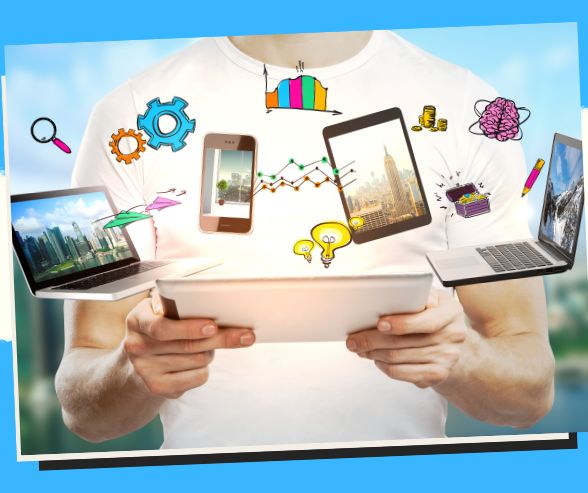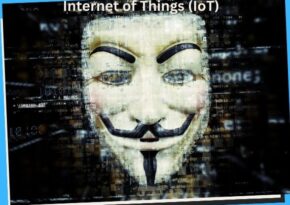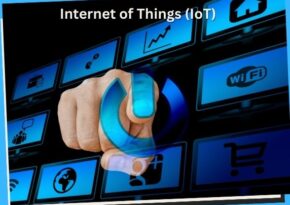
Redefining Trust: How IoT is Transforming the Digital Landscape 🚀
📡 Connect with confidence in an era of hyperconnectivity. Learn how IoT is revolutionizing how we trust and interact with smart devices in our daily lives. 🌟
🌐🤖 Trust in the Age of Internet of Things (IoT) 🤖🌐
The world around us is getting smarter every day. From smart thermostats that adjust the temperature in our homes to fitness trackers that monitor our every move, the Internet of Things (IoT) integrates technology into our lives. However, with this increased connectivity and data exchange, a pressing question arises: Can we trust the IoT devices surrounding us? In this article, we’ll embark on a journey through the IoT landscape, exploring the concept of trust in this brave new world of interconnected gadgets and gizmos. 🏠📱🤝
The Internet of Things Unveiled 🌟📡
Before diving into the world of trust in IoT, let’s unpack what IoT is all about. The Internet of Things refers to the interconnectedness of everyday objects and devices via the Internet. These devices, often embedded with sensors and software, can collect and exchange data to make our lives more convenient and efficient.
Consider some common IoT applications:
- Smart Homes: Thermostats, lights, locks, and appliances that can be controlled remotely.
- Wearable Devices: Fitness trackers, smartwatches, and health monitoring gadgets that sync data to the cloud.
- Connected Cars: Vehicles equipped with sensors and connectivity for navigation, entertainment, and safety features.
- Smart Cities: Infrastructure such as traffic lights, waste management systems, and environmental sensors that optimize urban living.
The IoT promises a world of possibilities, but with this new frontier comes the challenge of establishing trust.
Why Trust Matters in IoT 🤔🔐
Trust is the bedrock upon which any technology ecosystem is built. In the context of IoT, trust plays a crucial role for several reasons:
**1. *Security*: IoT devices collect and transmit sensitive data. Ensuring this data remains confidential and untampered with is essential to protect users.
**2. *Privacy*: Many IoT devices collect personal information. Trustworthy devices and systems should handle this data with care and transparency.
**3. *Reliability*: IoT devices are often integrated into critical systems like healthcare and transportation. Trust in their reliability is paramount.
**4. *Interoperability*: As IoT devices grow, ensuring they can seamlessly work together is vital. Users must trust that their devices will communicate effectively.
**5. *Consumer Confidence*: For IoT to reach its full potential, consumers must trust the technology. Fear of security breaches or misuse can stifle adoption.
Challenges to Trust in IoT 🤨🔍
Trust in IoT faces several challenges:
**1. *Security Vulnerabilities*: Many IoT devices lack adequate security features, making them vulnerable to hacking and data breaches.
**2. *Data Privacy*: Collecting and sharing personal data raise concerns about how that data is used and who has access to it.
**3. *Standardization*: A lack of universal standards for IoT devices can hinder interoperability and create compatibility issues.
**4. *Regulatory Gaps*: Regulations have struggled to keep pace with the rapid growth of IoT, leaving gaps in consumer protection.
**5. *Supply Chain Risks*: Vulnerabilities in the supply chain, such as malicious software or hardware tampering, can compromise trust.
Building Trust in IoT 🛠️🤝
Despite these challenges, building trust in IoT is both possible and necessary. Here are some strategies to foster trust in this interconnected world:
**1. *Robust Security*: IoT manufacturers must prioritize security from the design stage. Regular updates and patches should address vulnerabilities.
**2. *Data Encryption*: Data should be encrypted during transmission and storage to protect it from interception or tampering.
**3. *Privacy Controls*: IoT devices should offer users clear and granular control over their data, including opting out of data collection.
**4. *Transparency*: Manufacturers should be transparent about data collection practices and the purpose for which data is used.
**5. *Interoperability*: The industry should work toward common standards promoting device interoperability.
**6. *User Education*: Users should be educated about the risks and benefits of IoT, as well as best practices for securing their devices.
**7. *Regulations*: Governments and regulatory bodies should develop and enforce standards to protect consumers and incentivize secure IoT practices.
**8. *Third-party Audits*: Independent audits and certifications can help verify IoT manufacturers’ security and privacy practices.
Real-World Examples of IoT Trust Issues 🏢📉
To understand the tangible impact of trust in IoT, let’s look at some real-world examples:
**1. *Security Cameras*: Reports of security cameras being hacked and footage shared online have raised concerns about the security of IoT devices.
**2. *Smart Locks*: Instances of smart locks being remotely unlocked or hacked have highlighted the importance of robust security.
**3. *Connected Cars*: Vulnerabilities in connected car systems have led to concerns about the safety of IoT in transportation.
**4. *Health Trackers*: Sharing health data from wearable devices with third parties without clear user consent has sparked privacy debates.
**5. *Smart Home Devices*: Stories of strangers controlling smart home devices, like thermostats and speakers, have raised questions about security.
The Role of Blockchain in IoT Trust 🌐🔗
Blockchain technology, known for its transparency, security, and decentralization, holds promise in enhancing trust in IoT. Here’s how:
**1. *Security*: Blockchain
can provide a secure ledger for IoT devices, making it difficult for malicious actors to tamper with data or devices.
**2. *Data Ownership*: Blockchain-based identity and access control mechanisms can give users greater control over their data.
**3. *Interoperability*: Blockchain can facilitate trust among diverse IoT devices and platforms by providing a common, tamper-proof ledger.
**4. *Smart Contracts*: These self-executing contracts can automate trust and interactions between IoT devices without intermediaries.
The Future of Trust in IoT 🚀🔮
As IoT continues to evolve, trust will remain a central issue. Here’s a glimpse into the future:
**1. *5G Connectivity*: The rollout of 5G will accelerate IoT adoption, necessitating enhanced security and privacy measures.
**2. *Edge Computing*: Processing data closer to the source (at the edge) can reduce latency and enhance privacy.
**3. *AI and Machine Learning*: These technologies will detect and respond to IoT security threats in real time.
**4. *Blockchain Integration*: Expect more blockchain-based IoT security and trust solutions.
**5. *Consumer Education*: As IoT becomes more pervasive, it will be crucial to educate consumers about their digital rights and responsibilities.
Conclusion: Trusting the Digital Future 🏙️🌐
In the age of IoT, trust is the foundation upon which our digital future is built. While challenges abound, from security vulnerabilities to privacy concerns, the potential of IoT to improve our lives is immense.
Building trust in IoT requires collaboration among manufacturers, regulators, and consumers. By prioritizing security, privacy, and transparency, we can ensure that the promise of the Internet of Things is fulfilled—a connected world that enhances our lives without compromising our trust. 🤖🔐🌐
Related Queries
Redefining trust in the age of IoT
Navigating the IoT era with confidence
IoT’s role in building digital trust
Trust challenges in the age of IoT
Privacy and security in IoT devices
IoT’s impact on digital trust and security
The convergence of IoT and corporate confidence
Investing in the trust economy shaped by IoT
Smart devices and trust in the IoT era
The role of AI in IoT and trust
Save/Share this story with QR CODE
Disclaimer
This article is for informational purposes only and does not constitute endorsement of any specific technologies or methodologies and financial advice or endorsement of any specific products or services.
📩 Need to get in touch?
📩 Feel free to Contact NextGenDay.com for comments, suggestions, reviews, or anything else.
We appreciate your reading. 😊Simple Ways To Say Thanks & Support Us:
1.) ❤️GIVE A TIP. Send a small donation thru Paypal😊❤️
Your DONATION will be used to fund and maintain NEXTGENDAY.com
Subscribers in the Philippines can make donations to mobile number 0917 906 3081, thru GCash.
3.) 🛒 BUY or SIGN UP to our AFFILIATE PARTNERS.
4.) 👍 Give this news article a THUMBS UP, and Leave a Comment (at Least Five Words).
AFFILIATE PARTNERS

World Class Nutritional Supplements - Buy Highest Quality Products, Purest Most Healthy Ingredients, Direct to your Door! Up to 90% OFF.
Join LiveGood Today - A company created to satisfy the world's most demanding leaders and entrepreneurs, with the best compensation plan today.



 Business Technology, Finance Technology & Information Technology
Business Technology, Finance Technology & Information Technology





